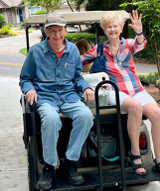OUTRAGED GRIEF
Put Your Anger to Work
Anger.
It’s the hidden emotion that I must poke around to unveil in my grief counseling. The only other emotion more concealed is relief. But that’s a topic for another day.
The objects of anger range from the deceased to doctors, to God, to self.
Maybe you feel like you should have seen signs of the disease yourself. Maybe you’re mad at God for letting your person suffer, or for making parents watch their child die, or children watch their parents die. Maybe the doctors missed the diagnosis and that made the difference. Maybe the government has been slow to fund research on this disease and now it’s cost you personally. Maybe your person didn’t take care of themselves or did something risky and could have prevented the death with better choices.
Anger is not a stage you experience once and move on from. It is woven throughout the grieving process for most people and often not far from the surface at any given time. You may feel sad, but anger is lurking in the background. You may feel joy when going through memories, but anger is still somewhere in the mix, depending on the circumstances surrounding the death. This constant background presence of anger, like theme music you can turn down, but not off, can create chaos for the bereaved spirit and body.
We tend to categorize anger as “bad,” and it can be one of the scarier emotions we, as humans, have. It can often present as explosive, chaotic, loud, and even violent, so in those ways it has earned its reputation as a negative emotion.
But anger is a justice-based reaction. It’s an innate response to a perceived wrong and it’s given to us to right those wrongs. And that’s how we usually use it. We get angry when a company rips us off, and we call and get our money refunded. We get angry when someone murders innocent people, and we put them in jail. We get angry when our kid gets bullied in school and we go to the principal about it or confront the other kids’ parents. We DO something in response to anger. We are supposed to.
But in this situation, what can we do? The injustice – the stealing away from us of someone we love – isn’t something we can right. There is typically no one we can charge with the wrong, and nothing we can do to reverse the damage.
So, we tend to try to tamp it down, reason it away, or pretend we don’t feel it. But emotions aren’t so easily disposed of. Unless we acknowledge them and give them the “out” they need, they tend to churn around inside us, taking chips out of our peace, and leaving us with another level of brokenness we can’t quite put our finger on.
Anger demands a response from us, and when we don’t give one, it quietly starts destroying whatever it can reach from within.
This can look different for different people.
This unresolved, undealt-with anger is often the wide-eyed culprit behind some of the depression that hits the grieving person. It’s often the reason for a seemingly unrelated meltdown over something small. It often wreaks havoc on other people we love, or those we work with. It steals our physical health in the form of heart issues, immune system functioning, fatigue.
While we cannot safely ignore our anger, we are also not at the mercy of this powerful emotion. The key is to wrest back control and learn to express our anger in a healthy way.
The first step is to accept the anger for what it is. Don’t feel like you must explain it away as something else. If your mother’s doctor missed the symptoms of cancer and early treatment would have saved her life, you have a right to be angry.
If your sister committed suicide after being bullied at school and several appeals to school administration and teachers resulted in no intervention, you have a right to be angry.
If your spouse didn’t take care of themselves, and laughed off your concerns about mounting health issues, you have a right to be angry.
If a distracted or drunk driver hit and killed your child, you have a right to be angry.
Define the anger, acknowledge it, and own it as rightfully yours.
Now take your anger and give it its own life. Write it out in an essay, or a letter to whomever you think deserves your wrath. Draw or paint it out into whatever form takes shape on the paper. Pound and beat a hunk of clay into whatever beast fits the feelings that you know are yours. Sit down at a chosen instrument and force the strings, or the keys, or the sticks or the brass to scream out for you the incredulous, justified, biting fury that so far only you have had to listen to. Let the anger flow off the tips of your fingers and breathe life into this creature whose reality only you know.
And then take this thing and show it to others. You might think they’ll be abhorred, but if they are, you’ve shown it to the wrong person. It’s far more likely that they will be relieved to see that someone has taken their own monster and caged it on a page, or in stone, or in song.
Exposure is the great disarmer. You’ll have struck a major blow to its power to harm both you and others.
Maybe you use this to affect real change in cases of medical neglect. Maybe you use it to entice legislators to enact stricter drunk driving laws. Maybe you use it to encourage people to take their health more seriously.
Or maybe all you use if for is yourself, to give this legitimate, righteous component of your grief the voice it’s been screaming for, so that you can rest in peace. Even if only until it boils back up and you do this again, periodically, as a new normal in your life going forward.
Not only will you edge just a bit closer to healing each time, but so will everyone who has the privilege of being allowed to share your wrath.
About the Author Donna Trimm Calk, LMSW
I am a New York State Licensed Master Social Worker. I received a Bachelor of Social Work from SUNY College at Buffalo and a Master of Social Work from Columbia University in New York City. I have a clinical social work background in Pediatric HIV, Pediatric Oncology, End Stage Renal Disease, and Hospice and Palliative Care. I’ve worked with children, families, and the elderly as they travel through terminal illness, anticipatory grieving, and the dying process. My clinical background includes individual counseling and support group facilitation.
I am currently the Bereavement Coordinator at Hospice and Palliative Care of St. Lawrence Valley. I carry a clinical caseload of individual grief counseling clients, facilitate support groups for students ranging from kindergarten through high school in area schools, train teachers, school counselors, and mental health professionals in the basics of grieving children, and provide crisis intervention counseling for schools, agencies, and businesses who’ve experienced a sudden and/or traumatic death within their community. I also facilitate specialty grief groups for widows, bereaved parents, bereaved teens, adults who’ve lost a parent, and suicide/overdose survivors.
Anger is a looming, largely subjugated emotion that I encounter during my work, and this article is my attempt to help people dive into this emotion and pull as much healing from it as possible.




